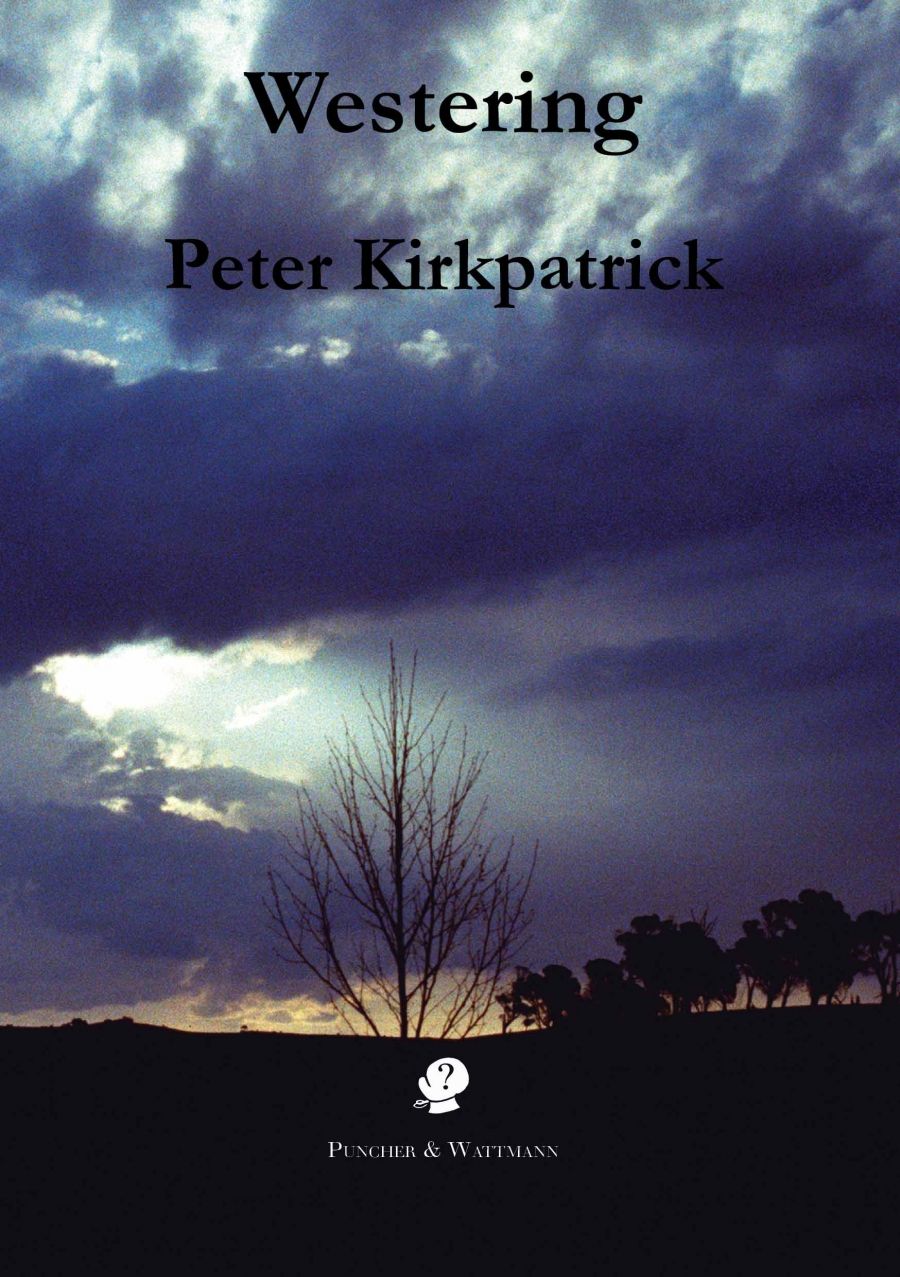
- Free Article: No
- Review Article: Yes
- Online Only: No
- Custom Highlight Text:
‘Westering’ is a resonant archaism which makes a wittily ironic title for Peter Kirkpatrick’s new volume. This is work which has a decidedly début du siècle flavour in its hard-edged urban perspective on ‘out west’. The dialectic of city/bush, with its history from Henry Lawson and Banjo Paterson to Les Murray, is voiced in several registers through these finely crafted and sharply literate poems.
- Book 1 Title: Westering
- Book 1 Biblio: Puncher & Wattmann, $24 pb, 63 pp
- Book 1 Readings Link: https://www.booktopia.com.au/westering-peter-kirkpatrick/book/9780975240519.html
Sometimes there’s sheep, grubbing among the tussocks
like fat maggots. When one of them on stilts
puts up a periscope you’ve seen an emu.
(‘Westering’)
Like other poems in the volume, most of these are edgily erotic. The speaker is characterised as a masculine rationalist, engaged with language’s potential to delineate and to explain, and the ‘you’ within the poem is a woman who is both content to play his games and at the same time as remote from him as the landscapes they visit in their westerly journeyings. All of this is as old as Ovid, of course, but these poems have the power to disturb, because their male speaker is ensnared and emasculated by Romance, mediated through Western linguistic and musical culture. ‘Castlereagh Highway: Turandot’ allows for the possibility of the speaker’s full emotional response to Puccini’s sublime music, but at the same time he is ready to be diverted from ‘Nessun dorma’ by country matters, which are, in the end, more diverting than the crescendos and finales of art: ‘And even you pick out the tune, raising / Wry eyebrows at me: None Shall Sleep tonight.’ At its best, as in this poem, Kirkpatrick manages this kind of antipodean Weltschmerz very impressively, but sometimes the wit is strained to the point of being blokily facile, as in ‘What did the famous doctor always say? / No ideas but in thongs? I’ll drink to that’ (‘La Côte d’Or’).
Juvenal’s ‘It’s hard not to write satire’ is as relevant to our era as it was to his, and although Kirkpatrick’s range encompasses some clever takes on consumerist fantasy, his greatest strengths lie elsewhere. ‘Tear Here: Lady Robinson’s Beach, Botany Bay’, for example, slips effortlessly from satire to a meditation on loss and the limited power of language to provide a stay against flux and mortality: ‘Tear here: The perforations of your footfalls / are the only lines you fully comprehend, / marking off the water’s wrinkled gladwrap / from the stale place you inhabit in your language. / And where do you imagine here can be?’
The understated verbal elegance and the intellectual energy of this and other pieces show fascinating affinities with the work of Kirkpatrick’s contemporary Stephen Edgar. Perhaps this is fanciful, but are we seeing the beginning of a new school of ‘Sydney’ poetry?
The centrepiece of this collection is a long poem called ‘Late Summer Light’, written to celebrate the wedding of two close friends. What a wedding gift this is, and what a contribution to the under-practised genre of the Australian occasional poem. Like the best examples of its kind (here I think especially of Vikram Seth’s paean to San Francisco in The Golden Gate [1986]), this big, singing poem moves out from the particular and personal to the universal and personal, and then back again. The anthropomorphic vision of blowsy, baroque Sydney joining in the nuptial day is great high-camp comedy, which modulates into a moving celebration of particular friendships in a particular time and space:
And let me make one final, personal wish.
If love can be a city, may it sprawl
radiant in late summer light, and warm
as sunbrowned sandstone, glittering in sweat.
whose arms reach like a swimmer’s to the sea
across a hundred bays and beaches.
(Peter Kirkpatrick, it should be noted, has written two lively prose works about Sydney’s cultural life.)
It is appropriate that this strong collection should conclude with a different kind of occasional poem, whose subtitle – ‘This Eco-Lodge My Prison’ – plays superbly silly homage to Coleridge. ‘Bucolic Plague’ returns to the bush metaphysics of earlier poems in Westering, but here the satire is leavened with a lighter humour that is refracted to the citified observer. The graceful parody of Coleridge and Wordsworth is made wittily relevant to the poem’s occasion of paying compliment to the ‘Cool refugee from Thatcher’s drizzling England’, who is the counterpart of Charles Lamb in ‘This Lime-Tree Bower My Prison’. Kirkpatrick pays tribute here not only to this friend within the poem (‘P.C.’) but also to that great Sydney architect Glenn Murcutt, and finally to cockatoos and gum trees. The concluding lines provide a provisional answer to the questioning Angst of the ‘Westering’ sequence: ‘I say, go take a leaf from the trees themselves / lie still, and let the landscape come to you.’


Comments powered by CComment